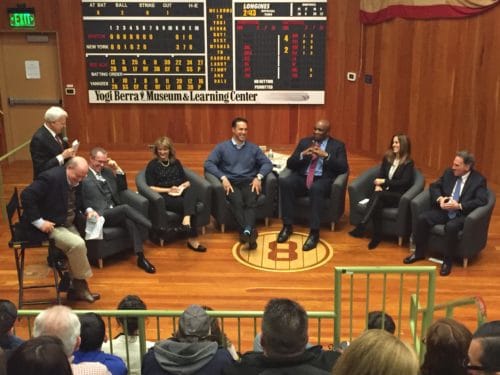
In collaboration with NYU’s School of Professional Studies Sports and Society Program, Mark Teixeira, Howard Cross and other panelists talked about the youth sports experience.
Photo by Emma Cimo
Former New York Yankees first baseman Mark Teixeira and former New York Giants tight end Howard Cross joined other sports experts – some from the New York University (NYU) and one softball mom from Montclair – to discuss youth sports at Yogi Berra Museum on Dec. 14.
Athletic powerhouses have seemed to be at the museum all the time recently, all looking to give respect to the late Yankee great Yogi Berra.
“He always lit up my day any time he was in the room and he is greatly missed,” Teixeira said. “Anything to be connected with [Berra] is special for me.”
Moderated by producer Ted Shaker, the six panelists – Wayne McDonnell, Clinical Professor at NYU; Dr. Marianne Engle, sports psychologist; Shannon Masur; mother of four and softball mom, Steve Young; a high school athletic director; Teixeira and Cross – discussed a wide range of topics surrounding the world of youth sports.
Cross and the panelists touched on the subject of bullying during the discussion.
“We always joked ‘if bullying had existed when we played football how many coaches would have been fired?’” Cross said regarding his years on the Giants.
Teixeira talked about the fine line between bullying and hazing that exists for young players.
“Kids are going to do dumb things, what they’re looking for is structure,” Teixeira said. “Kids need to understand the boundaries.”
Engle has met with her fair share of professional athletes who had suffered from bullying through her times as a sports psychologist. Engle said some athletes would talk to her about times they were humiliated, and Engle made a point that these are things “you don’t forget, no matter who you are and how good you are.”
They also touched on a wide range of areas of communication, from the player-coach relationship, the parent-coach relationship and the player-parent relationship. The panelists were nearly unanimous on their decision that parents need to let the coaches coach.
“You hear a lot in the stands,” Masur said, speaking of the inappropriate comments she hears from parents while watching her children’s games. Cross laughed as he highlighted those same comments, “it scares me to be in church with these people.”
However, their biggest opinions were on the topic of the relationship between parents and their child-athletes.
“Tell your child you love them,” Cross said.
Engle discussed a previous survey of hers, stressing the fact that athletes almost always care more about having fun while parents are usually the ones focused on winning.
She said that this why some athletes don’t want to talk to their parents after games, because they don’t want to talk about their performance. This leads children to believe that their parents care more about the sport than watching them play.
“That’s why kids play lacrosse,” Cross joked. “Parents don’t know what they’re watching.”
The program was hosted in collaboration with NYU’s School of Professional Studies Sports and Society Program.


